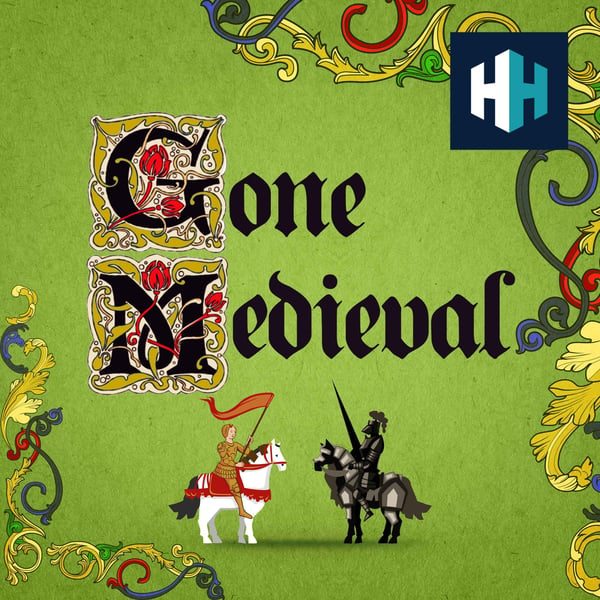Medieval New Year
Gone Medieval
History Hit
4.6 • 2.2K Ratings
🗓️ 1 January 2022
⏱️ 24 minutes
🧾️ Download transcript
Summary
In the medieval world, January 1 wasn’t actually New Year’s Day (that was March 25), but the anniversary of Jesus’s circumcision (according to the church). In fact, unlike many Christmas traditions, there’s very little in the way of New Years traditions we still do today that have medieval origins. Nevertheless, this was still a time of feasts, parties, and the medieval equivalent of the Black Friday sales (think less angry queues and more nobility buying themselves fancy swords and jewel encrusted model ships). In this special episode, Matt Lewis explains what medieval society got up to around this time of year, and why medieval new year was actually March 25.
Don’t forget to leave us a rating and review while you're here!
For more Gone Medieval content, subscribe to our Medieval Monday newsletter here.
If you'd like to learn even more, we have hundreds of history documentaries, ad free podcasts and audiobooks at History Hit - subscribe today! To download, go to the Android or Apple store
Music:
Able - Joseph S Greenier, David John Vanacore
Walk Tall - Johannes Bornlof
Dreams of Tomorrow - Daniel James Nolan
Godsend - Johannes Bornlof
Galivant - Bradley Andrew Segal, Bong H. Jung, Chang Wooi Kang
Reverse - Matthew Burnette Heath, Noel Arthur Goff, Kristen Lee Agee
We Wish You A Merry Christmas - Kevin MacLeod / unknown (english christmas carol), Public domain, via Wikimedia Commons
Worst - Brian Scott Carr, Kristen Lee Agee
Vad Rost, Vad Ljuvlig Rost Jag Hor - Kurt Lyndon
Hosted on Acast. See acast.com/privacy for more information.
Transcript
Click on a timestamp to play from that location
| 0:00.0 | Have you ever wondered why one of Ruan Cathedral's towers is called the Tower of Butter, or what |
| 0:06.2 | animals have faced trials in courts for, or even how the black country got its name? |
| 0:12.4 | Well, you can find the answers to questions like these and hundreds more in our new book, |
| 0:18.4 | The History Hit Misscellany. It's the perfect present for any history fan. |
| 0:23.3 | It's available to buy now from your favourite bookshop or by visiting historyhit.com forward slash |
| 0:29.9 | book. Welcome to this episode and a brand new year of Gone Medieval. |
| 0:39.2 | I'm Matt Lewis. I hope you've enjoyed a wonderful Christmas as we spoke about last time |
| 0:44.1 | in the Christmas episode. So much of what we associate closely with Christmas today comes from |
| 0:49.6 | medieval traditions. The name of the season, the reason it falls where it does in the calendar, |
| 0:55.2 | the idea of a huge set piece meal of Santa Claus, the Christmas tree, singing, |
| 1:01.0 | playing games, whether we knew it or not, we've all gone medieval at Christmas if we've ever |
| 1:05.9 | celebrated it. So what about new year? Can we say the same for the first of January, |
| 1:11.5 | as we can for the 25th of December? Well, given my mission to prove that everything is medieval |
| 1:17.7 | really, you better believe I'm going to try. The glaring issue to deal with, first of all, |
| 1:23.7 | is the date. Various dates around the world are used to celebrate new year. |
| 1:29.7 | The first of January was the beginning of a new year under the Julian calendar introduced by |
| 1:35.6 | Julius Caesar in 46 BCE. The Roman empires annual cycle used the date for a moment known as |
| 1:45.8 | Callens, a term that continues in use throughout the medieval period. The Callens was a name for the |
| 1:52.4 | first day of each month and the Callens of January marked the beginning of a new political as well |
| 1:58.8 | as calendar year. The empires officials would take up their new offices from this date to serve |
| 2:05.3 | throughout the year, so it really was about new beginnings. January is named for Janus, |
| 2:12.4 | the Roman god of beginnings, doorways, duality and various other things. Janus had two faces, |
... |
Please login to see the full transcript.
Disclaimer: The podcast and artwork embedded on this page are from History Hit, and are the property of its owner and not affiliated with or endorsed by Tapesearch.
Generated transcripts are the property of History Hit and are distributed freely under the Fair Use doctrine. Transcripts generated by Tapesearch are not guaranteed to be accurate.
Copyright © Tapesearch 2025.

